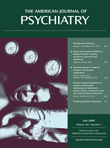To the Editor: We read with interest the commentary by Patrick A. Rabjohn, M.D., Ph.D. and Joel Yager, M.D., published in the March 2008 issue of the
Journal, which discussed the effects of resident work-hour regulation on psychiatry
(1) . We wish to highlight the specific repercussions of work-hour regulation on consultation psychiatry.
As consultation psychiatrists who work in academic general hospitals, we have noticed a seismic shift in the “ownership” of patients by residents in other specialties
(2) . Since Accreditation Council for Graduate Medical Education (ACGME) regulations were adapted, a team-based shift-work approach has replaced the traditional model of work hours. The most immediate effect of this replacement model on the consultant psychiatrist has been to render more difficult clarification of the reason for psychiatric consultations. Attempts at such clarification are frequently met with an assortment of buck-passing responses, such as “I’m just covering”; “It’s not in my sign-out”; “I was just told to call it in”; or “Just ask the team in the morning.” This diffusion of clinical responsibility across the breadth of a multimember team leads to an absurdist interaction of the patient and psychiatrist sitting together in a hospital room, with neither knowing why the other is there.
Another, perhaps more disturbing, result of work-hour regulation has been the farming out of the doctor-patient relationship to psychiatric consultants. The team approach does not allow for the development of a relationship between the patient and any single physician because patients are typically seen by several different residents each day. If a psychiatric consultation is placed, the psychiatrist that provides the initial evaluation usually returns on subsequent days to provide follow-up, allowing for a constancy of interaction that fosters the familiarity, comfort, and support that has been traditionally provided by the primary physician.
This outsourcing of the doctor-patient relationship bodes poorly for two chief reasons. First, it engenders the risk of producing a generation of non-psychiatrist physicians who are inexperienced in the human aspects of medicine. When these trainees complete their education, some of them will practice in settings where psychiatric consultation is not easily available and then realize the forfeited opportunities to learn vital elements of doctoring. Second, our own trainees have already begun to express frustration with consultation work, since they are not often asked to diagnose or treat a patient but instead to participate in a relationship that they (and often the patient) identify as one that belongs to someone else. This dissatisfaction may portend future difficulty in recruiting residents to careers in consultation psychiatry or psychosomatic medicine.
The aforementioned is not intended to castigate non-psychiatrist physicians, who often attempt to address psychosocial issues through consultation, nor is it intended to blame the medical education system. Medicine has become more complex, and team-based approaches are here to stay. However, the time has come to acknowledge the disconnect between the humanistic rhetoric of medical training and the real-life obstacles to its practical implementation. The relationship between hour reduction team-based care and psychiatric consultation might be a good place to start.

